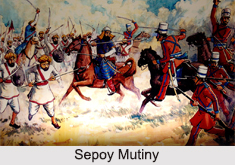 The Sepoy Mutiny of 1857 was against British rule in India, when many Indian states were attacked to remove Britishers from the respective territories. But the Britishers proved to be to a strong opponent. They planned attacks and gathered resources to deal with the Indian rebels. What resulted was unrest in different Indian states. Given below are the Lucknow Unrest, Allahabad Unrest and Benaras Unrest.
The Sepoy Mutiny of 1857 was against British rule in India, when many Indian states were attacked to remove Britishers from the respective territories. But the Britishers proved to be to a strong opponent. They planned attacks and gathered resources to deal with the Indian rebels. What resulted was unrest in different Indian states. Given below are the Lucknow Unrest, Allahabad Unrest and Benaras Unrest.
Allahabad Unrest
Allahabad developed at the junction of the Ganga River and the Yamuna River. There was a time when the town, the civil station and the cantonments came under the control of the rebels. Unrest in Allahabad took the form of sacking of the treasury, breaking of the jails, ruining of the European shops and the destruction of the railways and the telegraphic wires. The Europeans and Eurasians, wherever spotted, were cruelly mutilated and tortured. It is known that later the sipahis disbanded themselves and made their way in small parties of twos and threes, each to his native village.
Lucknow Unrest
The city of Lucknow was built on the west bank of the Gomti River. When the rebels had penetrated within the city, they began to loophole many of the houses in the vicinity of the Residency and the Machchi Bhawan. They went so far as to invade one of the posts of the Residency, afterwards known, from the officer who ultimately commanded there, as Anderson`s post. The following evening Sir Henry, threatened at both points by the enemy, caused the defenses of the Machchi Bhawan to be blown up and concentrated his forces within the Residency enclosure. Thus, it can be comprehended that the Unrest in Lucknow was caused by a contest between the Britishers and the rebels.
Benaras Unrest
The city of Benaras developed almost midway between Calcutta and Delhi. In 1857, Frederick Gubbins of the Civil Service, then a District Judge arrived in Benaras. At the time Gubbins was bombarded with stones, urging him to save his life. But he was determined to execute his reforms. The people seemed equally determined. They had closed their shops and had stopped selling grains and other wares. But Gubbins was not broken by these actions. He gathered supplies from Mirzapur . Three days later when he heard that the leaders of the movement were about to hold a meeting in the city, he moved to the spot with two companies of sipahis. He then arrested them and contained them in prison. The next morning he rode through the city and opened all the shops. From that moment, he became the lord of Benaras. Gubbins also had to face other challenges put forward by the rebels, causing unrest in Benaras.



















